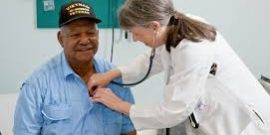What to know if you get care outside of VA
If you’re experiencing a medical emergency, you shouldn’t hesitate to get emergency care. Call 911 or go to the nearest emergency room quickly. A medical emergency is an injury, illness, or symptom so severe that without immediate treatment, you believe your life or health is in danger.
Some Veterans live far away from a VA emergency room and need to get care quickly. If you go to a non-VA emergency department for care, VA may still offer coverage.
Notifying VA is necessary for getting coverage and sharing important medical updates. We have the information you need to make it happen.
Notify VA as soon as possible
During a medical or mental health emergency, we encourage you to seek immediate medical attention right away. You don’t need to check with VA before calling 911 or going to an emergency department. But it’s important that the facility treating you notifies VA within 72 hours.
Promptly notifying VA allows them to coordinate care or transfer to a VA medical facility, if necessary. It helps VA check if the requirements for them to pay for the care are met and may impact a Veteran’s eligibility for coverage.
Payment by VA is limited to the time of stabilization, except when:
- VA is contacted upon stabilization but can’t accept the transfer of the Veteran, and
- The community care facility made and documented reasonable attempts to transfer the Veteran to a VA or other facility.
How to notify VA
It’s best to ask your emergency care provider to report the treatment to VA’s Centralized Emergency Care Reporting Center as soon as possible. If you’re able, tell your care provider that you’re a Veteran. It’s a good idea to remind caregivers and other family who might be with you in an emergency that they should tell a care provider your Veteran status.
Your emergency care provider should report the treatment using the VA Emergency Care Reporting portal or by calling 844-724-7842.
Be prepared
If you live in an area where you may need to seek health care outside of VA, prepare before you go. Locate your closest emergency department so that you don’t have to worry about that during an emergency.
You can also plan by locating your nearest urgent care facility. Urgent care is different from emergency care. Urgent care services are for less than life-threatening illnesses or injuries, like strep throat or pink eye. Save yourself time later by keeping a handy list of the urgent care clinics closest to you. Find out in advance which ones are in-network with VA.
Remember: If you’re seeking emergency services, you don’t need to check with VA before calling 911 or going to an emergency room. Getting care when you need it is the priority.
My HealtheVet Emergency Information
Be sure to keep your emergency contact information up to date in My HealtheVet. Log a name, contact method, and phone number for people who should be contacted in case of emergency. This tool is for your records only—your VA health care team won’t see it unless you share it with them.







Oh, I see. It's a good thing you made it clear that any life-threatening situation can be considered a medical emergency. I have a neighbor whose daughter fainted a couple of hours ago. Maybe the time has come for someone to take her to a healthcare facility quickly so she can recover.